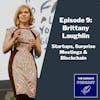Episode 2 - Exploring Mission Driven Ventures with Nettra Pan

Nettra is a researcher and educator working at the intersection of organizational decision-making, entrepreneurship and public policy. Nettra’s research focuses on how firms resolve tensions between commercial and seemingly non-commercial imperatives, including perceived tensions and resolutions in numerous contexts, including in investment firms seeking investments in mission-driven technology ventures.
Key Takeaways
What exactly does ‘Mission-Driven’ investing mean and more importantly, how does this lens affect the decision-making process for investors? How can you find opportunities in Social VC on a global scale?
There’s No Single Definition of “Social Impact Investing”
Social Impact investing is a broad capture for all things in this arena. There are many ways to think about how the “social” aspect of a company’s mission play into its growth, opportunities, and challenges — for all stakeholders – from founders to funders.
“I would say that as a founder, you need to get funding from people who are going to provide you with smart money, and the term that I’m introducing is heart money – basically that you’re aligned on the mission.” – Nettra Pan
Exploring Mission Driven Ventures with Nettra Pan
Hey! Thanks for checking out the GoingVC Podcast: Uncovering new paths into VC, diving deeper into alternative models, and addressing areas of weakness every second Monday with Austin and JJ MacLean (@jjmaclean) from the GoingVC team.
We're really excited to be bringing to you today our conversation with Nettra Pan (@nettra).
If you've got any questions, feedback, guest ideas, or just want to say hey, don't hesitate to shoot us a message at podcast@goingvc.com
Chapters:
Introduction
Nettra’s Background & Research - 01:57
Traditional vs. Social Ventures - 05:44
Fundraising For & Investing in Social Ventures - 10:30
Social Venture Performance - 19:41
Wrap-up & Closing Thoughts - 22:52
The transcript has been edited and condensed for readability.
Nettra’s Background & Research
JJ: [00:01:57] Thanks for joining us today Nettra! To kick things off, could you tell the listeners a bit about your background?
Nettra Pan: Okay! Starting from the beginning, I was born in Southern California. My parents were both born and raised in Cambodia. In the seventies, Cambodia had a civil war and a genocide, which my parents luckily survived, and when the country was at peace again, they decided to return.
I left Phnom Penh when I was 18 to study political science at Columbia before studying international affairs in Paris and, most-recently, Management of Technology at the Swiss Federal Institute of Technology.
Austin: [00:02:42] That’s quite the background! I’m curious; you obviously have a broad spectrum. How has that influenced where you’re at today?
Nettra Pan: Yeah, growing up in Cambodia, I witnessed a lot of poverty and thought, okay, I need to learn economic development and maybe work in government or at the United Nations. That was my teenage dream. However, after learning how these big bureaucratic organizations sometimes are, I pivoted and thought, okay, maybe I need to find a smaller organization that’s more innovation and nimble. Then, I joined a cool-sounding education nonprofit that ended up mismanaging funds, and that’s what pushed me towards the private sector. Towards figuring out, is there a way to both generate revenue and pursue social good.
Austin: [00:03:32] I think that’s a great segue; I really want to talk about your paper, which is very unique in the space. I’ll try and cue it up for you, then you can tell me where I’ve gone wrong, and then I’d love to get into the details.
My background is as a public investor asset manager, and I know there’s a lot of academic research on behavioral biases. There are two general takeaways: you can study them to create opportunities for yourself or review them to see how managers make decisions. And then it seems like you’re attacking this from an environmental, social, governance (ESG) dimension of how likely are managers to incorporate pro-social causes into their decision making and what’s the impact?
Nettra Pan: Absolutely! That’s a great run-down. If we look at traditional private funding, it’s either gone to purely charitable foundations or purely financial investments. ESG investing is fairly new.
ESG is a filter based investment approach, where you say: we’re not going to invest in tobacco or oil & gas or other harmful industries. What I look at, though, is not filtering out the bad, but almost the flip-side, actively seeking-out what’s the best way to do good while investing in private companies.
Austin: [00:04:55] How do you do that? There are limited data, even in the public space. Can you break down for us your approach to the research?
Nettra Pan: Yeah! A friend of mine always says: ‘there’s no such thing as research, only me-search,’ and that’s why I gave you a little bit of background on my personal story because I was interested in basically figuring out which nonprofit should I volunteer at to have the most impact? Or which company should I join? I couldn’t answer that question, so I thought, ok, let’s study social venture capital firms. They want to do good, but they also want outsized returns.
I spent about 25 months following a social venture capital firm; I attended all their investment committee meetings, analyzed 1600 investment decisions made over five years while also running additional independent studies with other investors.
Traditional vs. Social Ventures
JJ: [00:05:44] Cool! Before we dive into that, could you define for the listeners what a social venture or social venture capital fund is so that everyone is on the same page?
Nettra Pan: Sure! There are two ways to think about it. The first way is as a for-profit firm that was started to solve a critical social or environmental problem. You can think about it as a venture that happens to be solving a United Nations Sustainable Development Goal (SDG). That’s my particular definition.
There are 17 of these goals, and the fantastic thing is that all 193 member states agreed on them!. For example, a great company called BioCarbon Engineering makes biodegradable seedpods that you can shoot into the ground, decreasing the cost of planting from $30 to 3cents. I want to bring up a second, more relaxed, way to think about it, though: a venture that does what the founder and its key stakeholders wanted to do.
In business school, we tend to think a lot about making a lot of profit, but that’s not actually what motivates entrepreneurs to start companies.
Austin: [00:06:54] That’s interesting! How would you recommend an LP who wants to invest in funds that are investing in these types of companies change viewpoints on what matters? It’s not going to be about the return streams necessarily; it’s really about the impact. How does it work from that perspective?
Nettra Pan: One way to think about it is, what kind of companies would I like to be investing in, in the future? I think it was in the Netherlands that their pension funds’ stakeholders wanted them to do more impact investing. The problem was though; there were very few large, impact-driven, public companies to invest in. So as an LP, you’re like, what do I do if I want to invest in those companies down the line? Well, maybe I should contribute to funding them in the earlier stage and build up that pipeline.
Austin: [00:07:40] That’s interesting! I’m going to go out on a limb here and say that the United States is probably a little behind on this. Do you see more of it in Europe?
Nettra Pan: That’s a fascinating question! As a term, Impact investing was actually coined in 2007 by the Rockefeller Foundation, and by and large, the majority of impact funds are American. They kind of paved the way for this. In general, North America, we can bring Canada in, is much more developed in startup culture, startup support, etc. So even though you’d think Europe would be more open to this, the business and startup-y side of things are more robust in North America.
JJ: [00:08:19] Gotcha! One of the things you talk about in your paper is a concept called identity duality, and about how organizations serving dual purposes was historically linked to failure, but that they can actually act synergistically. Could you talk about what differentiates the two? What makes a dual-purpose organization successful, and when is it not productive?
Nettra Pan: Identity Duality. This idea was introduced by Stuart Albert and David Whetten in a seminal paper published in 1985 when they noticed what happened to a higher education institution after a budget cut. Essentially, what played out was a huge uproar because it was caught between its profit motive and its educational mission.
We can think about it in the basic terms of what makes an organization successful: the managers and the stakeholders are very clear on who they are and what they do. If you think about that in a startup space, it’s even more critical because you have limited resources. You need to be one hundred percent focused.
It’s then easy to understand why companies that don’t have these clearly defined may think they’re doing two different things that cancel each other or split the organization, which in turn can often, but not always, lead to failure.
JJ: [00:09:47] Gotcha! So a vital social mission can be an advantage?
Nettra Pan: It can be! If the rest of their organization is aligned. To give you an example, there’s this cool startup called Winnow; it’s raised Series B now that’s developed a hardware + software solution that allows industrial kitchens to track, and therefore reduce, their food waste. So you have an offering that directly supports a social goal, but Winnow went beyond that, and this is the cool part, they charge as a percentage of how much food waste is saved, so immediately you see a reinforcing mechanism.
Fundraising For & Investing in Social Ventures
Austin: [00:10:30] Wow! In terms of the fundraising process for companies like this, I would imagine you almost have to sort of tweak your deck or tweak your, your mission in a sense, or are you finding it that VCs who are more traditional commercial-oriented are equally open to these companies, to fund and help grow?
Nettra Pan: That’s a really excellent question! I would say that as a founder, you need to get funding from people who are going to provide you with smart money as well as a term I’m introducing, ‘heart money.’ You’re aligned on the mission, and you have the mechanisms to support that social mission.
Imagine a social venture goes to a hard-nosed fund and pretends they only care about profit; if they get funding from that investor, they might be forced to get rid of their social side. Let me make it clear with a concrete example. Have you heard of the Food Assembly?
Austin: [00:11:23] No, I don’t think I have!
Nettra Pan: They started as ‘La Ruche qui dit Oui!’, which means ‘the Hive That Says Yes.’ What they do is they have this platform where you can team up with your neighbors to make a bulk order from a local farmer. I could join up, say, with eight of my neighbors and place a big order of carrots. I get access to fresh produce, get to support a local farmer, and bypass the supermarket chains that squeeze their margins, and the platform takes a percentage. Everyone’s happy.
They were founded by two people; one of them, Guilhem Chéron, was an industrial designer who’s passionate about food and nutrition. Fred Wilson from Union Square Ventures went to one of these events where the farmers arrived with their produce, and he said, this is amazing people were so excited, they showed up, they were super passionate.
If you think about that, what do VCs want? They want to invest in ventures that have a product that people want. They (Fred/USV) ended up being a lead investor in their Series B round.
Austin: [00:12:23] Wow! Switching gears a little bit, many of our listeners are very interested in breaking into venture capital, any things you would mention to those folks who now want to break in as social impact venture capitalists?
Nettra Pan: Good question! The best way to get into this space if you don’t know what you are passionate about is trying different things! If you know what you’re passionate about, it’s easy! If you’re passionate about education, you can volunteer at a school or work for an EdTech startup, or at a fund that invests in EdTech.
If you don’t know what you’re interested in, just try different things! One of the special things about the impact VC space is that you are going to be successful if you have the right combination of skills and we’re rarely born or have a professional trajectory that combines all of them.
Let’s say someone’s good in business, and they want to get into education, but then they find out that they don’t know anything about that, and they have to find a person who has that background and is open to this hybrid approach. My advice would be to try different things because you never know how it will be combined.
Austin: [00:13:42] That’s great! What about the other side? How can venture capital funds get better at recognizing and taking advantage of social impact? Can they build it in as a mandate? How would you recommend that they go about doing that and incorporating more social impact investing in their operations? Knowing that some LPs might not have signed up for this.
Nettra Pan: Good question! I think there are two ways. I would ask venture capital funds to look a little closer at the deals they’re getting. They might meet a passionate founder and think: ‘oh my gosh, she’s going to lose this money because all she cares about is helping the poor children in Cambodia,’ but a lot of founders, especially in this generation, are really familiar with the idea of a hybrid venture. Maybe they lack that business acumen. You could make a difference by finding a co-founder or providing that necessary business acumen to help them profitably achieve their goals.
Taking a closer look and actually doing some work on decision-making bias is another thing. Depending on how they see themselves, investors will often focus in a laser-like way on a particular criterion. They’ll say this guy doesn’t have an MBA or doesn’t have a business background; therefore, the venture will seem much less attractive.
The second thing they could do is launch a mandated fund, a fund where they’re only allowed to invest in a specific social industry. There’s a great fund called Mustard Seed that has themes related to education, healthcare, relationships, environment, and economic inclusion. Another great fund in Canada, Peak Ventures, has a gender lens. And there might be some LPs that have a particular interest in that type of thing.
The VC has to be careful, though; they really need to figure out what they or their team wants to achieve. They need to basically do their homework, have the right people on their team, and ask themselves, are we doing this for the right reasons? Or just because this is hot right now, and it’s going to give us a visibility bump.
JJ: [00:16:02] Expanding on that and getting nerdy here → , how does that impact the evaluation process? When you’re looking at a hybrid venture, are you trading one goal off against the other, trying to find the optimal spot along the, for lack of a better phrase, production possibilities frontier?
Nettra Pan: Really interesting question! I think what is key to understand here is that we are really dealing with synergy versus trade-off. Some see it as a trade-off, so they go towards one end of the production possibilities frontier because they don’t want to have to reduce the commercial outcome. That’s how they see the possibility landscape.
Then, on the other hand, you’ve got your truly hybrid social venture capital investors that are looking for those unicorns that are going to have a substantial social impact at scale. That social impact will fuel further scale and further profits that will be reinvested back into the mission. The best social ventures truly do combine both are going to be super attractive to traditional venture capital firms.
Austin: [00:17:14] I think what would be interesting is I want to throw you a hypothetical, and I want you to tell me if it’s really social-impact investing or not.
If I were to pitch you a company that said we’re going to go to Haiti and we’re going to build the ability for teachers in the US to remote teach students in Haiti, our goal is to sort of see how this works and then scale this globally. How do you look at a company like that? More broadly, how can VCs truly break down what’s social impact and what’s not? Because I’m sure, there’s a lot of gray areas.
Nettra Pan: Yeah! One of the things that drew me to using a market-based model for some social or environmental problems is that you’ve got to make a case that your product is worth buying. And if you’re not making that case successfully? The customer can walk away. Traditionally, in humanitarian aid situations, that wasn’t the case. You’d dump rice or used clothes, and the community has to deal with it. I would say that it’s more than a gray area; it’s actually quite dangerous.
For founders who are curious about this social venture trend to be like: ‘I’m just going to go to Haiti, or I’m going to go to Africa, and I’m going to do exactly what I would’ve done here, but over there.’ Because again, you need to use the entrepreneurial mindset and ask yourself, do I have what that target market segment wants? It really would depend on the founder’s background and track record. I need to understand why this makes sense, why you.
Austin: [00:18:45] Yeah, I would imagine that the founder and the team’s strength are critical, especially in many emerging markets where you’re not expanding the existing market; you’re starting from the ground up. That team has to really know what they’re doing. I’d also imagine the due diligence is a bit different from a traditional venture capital funding process as well?
Nettra Pan: Yes and no! The team is super, super important, and again, talking from the POV of a hybrid social venture capital firm, someone who really wants to maximize on both, what you’re going to want to check most of all is the authenticity and commitment of the founder to the social mission because that can’t be bought and can’t necessarily be taught.
If you have the social mission person, you can supplement it with a business team or give that person business training. But you’re not going to make a business person suddenly care about a cause that they’ve never cared about in their life.
Social Venture Performance
Austin: [00:19:41] Is there any evidence that more socially oriented companies are more successful? If they have a real mission beyond generating profits, does that help them sustain themselves during bad times?
Nettra Pan: There’s been a lot of research in this area started by corporate social responsibility (CSR) scholars, basically trying to prove that there’s a correlation between CSR and profits. My favorite paper on CSR, in particular, is one where we see that it depends. And specifically, it depends on whether that company has the resources to carry out that social activity.
Danone, for example, makes yogurts. They might be good at some social impact activity linked to nutrition because that’s related to their core offer. And in fact, that is a fascinating case because they actually did a lot of soul searching and decided at some point that they were going to focus on nutrition and sold-off all their ketchup, mayonnaise, and non-nutrition offerings. Do you see the link between core competency and social activity?
Austin: [00:20:56] Yeah! It seems like a lot of these public companies have spun off venture investment arms or divisions to focus on more sustainability tech or things like that. It’s excellent PR, but I would imagine that there are real benefits to doing that?
Nettra Pan: Absolutely! There is evidence from Morningstar, for example, that impact funds are actually outperforming traditional indices. I would ask people to think about their favorite products, their favorite brands. They’re attached to a story and, and we have to admit that the social impact story is a really powerful one. The data is not there yet in terms of social ventures because traditional venture funds have been around longer, but we don’t have any reason to expect they’d underperform.
Austin: [00:21:42] That makes a lot of sense! Indeed, from the public space you’ve seen, ESG is an investment factor; it can lead to outperformance. There are real costs for companies to migrate business lines and take on the regulatory requirements of doing all that thing. Companies that have already done that or don’t have the baggage of these governance drawdowns are ahead.
I think it’s here to stay, so it’s great to see that that’s permeating in the private space as well. It’s only going to get better, and the data will be more available, and we will do more with it. It’s really exciting!
Nettra Pan: Yeah! I always say there are four reasons why someone would want to venture into the social impact venture space:
Personal meaning, they think it’s personally meaningful to be in that space. Next up is public pressure or regulations. That’s what you said, Austin, about being ahead of the curve. Then there are strategic reasons; it might make sense from a business expansion perspective, or with the brand they already have, it makes sense to go into that space strategically. Finally, there’s experimentation. It might make sense for people to innovate, try things out, and see what happens.
Wrap-up & Closing Thoughts
JJ: [00:22:52] Definitely! I would love to close-out with another nerdy question. You mentioned earlier about the importance of social venture investors being aware of their decision-making biases; what else stood out when analyzing those 1600 investment outcomes?
Nettra Pan: Great question! I would bring this back to the theory of organizational identity. If you think about how to do something well, it’s good to know who you are and what you are trying to do. One strategy that I observed during my fieldwork was this idea of tinkering.
By that, I mean when a social venture capital fund saw a potentially attractive venture. A unicorn in disguise, a lot of funds might turn it away because it’s not up to their standards at first glance. However, this social venture fund might say: ‘well, we know how to spend a few weekends helping the founder find a suitable pricing model.’ Roll up their sleeves and get under the hood. They went back and forth helping this social venture, and increased app downloads, they increased client sales over just a few months. Suddenly, where there was no attractive investment, one was there, and it made the decision a no-brainer. I think this applies to other venture capital funds too.
I’m not saying go and look for crappy ventures. I’m saying understand what your expertise is. Maybe you have an excellent talent network, so you can invest in ventures that are missing a specific person that you can quickly fill. And I’m not talking about replacing the CEO because that’s what many bad funds tend to do. It always comes back to knowing who you are, what you’re good at, and that will allow you to identify and create investment opportunities.
Austin: [00:25:04] That’s super interesting! The social impact angle is certainly one we will be looking out for more research in. I think they’re all questions that every venture capitalist should be asking themselves.
Nettra: Couldn’t agree more!
JJ: [00:25:30] To close-out, is there anything else you want to leave the listeners with?
Nettra Pan: Yeah! We talked about a lot of different models. Purely social, purely profit-oriented, and hybrid. What I would want to leave with listeners is not that one of these is superior, but that there’s a whole spectrum, and there’s an entire landscape of different things you can do.
I want to leave the listener space and permission to go out there and explore. Try things on and figure out which structure makes sense for them, which content space makes sense for them, and which industry makes sense. It’s wide open.
Nettra Pan: Yeah! I think we’re going to see many changes going forward, and it’s probably better to be the one initiating the change than feeling the impact of it.

Nettra Pan
Assistant Professor of Entrepreneurship at Bayes Business School
Nettra is a researcher and educator working at the intersection of organizational decision-making, entrepreneurship and public policy. Nettra’s research focuses on how firms resolve tensions between commercial and seemingly non-commercial imperatives, including perceived tensions and resolutions in numerous contexts, including in investment firms seeking investments in mission-driven technology ventures.
New to The GoingVC Podcast?
Here are some great episodes to start with. Or, check out episodes by topic.



































